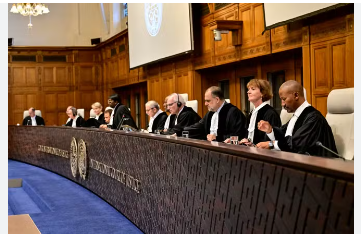South Africa Submits in a significant escalation on the global diplomatic stage, South Africa has officially filed what it claims is concrete evidence of “genocide” committed by Israel against Palestinians in the occupied territories. This documentation was submitted to the International Court of Justice (ICJ), marking a notable legal development in international relations. South Africa, known for its longstanding support for Palestinian rights, argues that these actions by Israel constitute violations under international law, specifically regarding the protection of civilians in conflict zones.
1. Background: The Palestinian-Israeli Conflict
The complex, ongoing conflict between Israel and Palestine has persisted for decades, with its roots deeply intertwined in historical, territorial, and political tensions. The struggle began in the mid-20th century, following the establishment of the state of Israel in 1948. Palestinians were displaced, and territorial disputes ensued, leading to multiple wars, uprisings, and enduring hostilities. The territories of Gaza and the West Bank have remained focal points of contention, with Palestinians seeking an independent state and Israel maintaining significant control over the regions.
The humanitarian impact of this conflict has been catastrophic, with significant loss of life, displacement, and socio-economic degradation affecting millions. Palestinian civilians in Gaza and the West Bank often face severe restrictions, limited resources, and periodic violence, fueling international outcry and calls for intervention.
2. South Africa’s Stance on the Palestinian Cause
South Africa’s position on the Israeli-Palestinian conflict is influenced by its own history of apartheid. Since the end of apartheid, South Africa has been a vocal advocate for Palestinian rights on the world stage, often comparing the situation in the Palestinian territories to its own experience of racial segregation and systemic discrimination. This stance has positioned South Africa as one of the most outspoken nations regarding alleged human rights abuses in the region.
South Africa’s support for Palestine has translated into both diplomatic efforts and public declarations condemning what it views as Israel’s mistreatment of Palestinians. South African officials and civil society groups have consistently called for actions against Israel, including sanctions, boycotts, and now, legal action at the ICJ.
3. The Nature of South Africa’s ICJ Case Against Israel
The International Court of Justice is the principal judicial organ of the United Nations and has the authority to settle disputes between states and provide advisory opinions on legal questions referred to it by international agencies. South Africa’s decision to take its case against Israel to the ICJ represents an attempt to hold Israel accountable through legal avenues, South Africa Submits potentially setting a global precedent if successful.  for the more information click on this link
for the more information click on this link
South Africa’s submission reportedly includes evidence of actions that it contends amount to genocide against Palestinians. The claim centers around multiple instances where, it argues, Israel’s military and political decisions have directly led to large-scale harm to Palestinian civilians, South Africa Submits particularly in the densely populated Gaza Strip.
The legal challenge reportedly cites evidence of actions that could align with the Genocide Convention’s definition, which includes acts intended to “destroy, in whole or in part, South Africa Submits a national, ethnical, racial or religious group.” These may involve:
- Alleged systematic targeting of Palestinian civilians in military operations.
- Policies and actions that South Africa claims result in long-term harm to the Palestinian population’s health, economic stability, and ability to sustain a viable society.
- Blockades and restrictions that affect the daily lives and freedom of Palestinians, particularly in Gaza, limiting access to essential resources such as food, water, South Africa Submits medical supplies, and electricity.
4. Legal Implications of the Genocide Accusation
Alleging genocide is one of the most severe charges in international law. The Genocide Convention of 1948, which both Israel and South Africa are signatories to, defines genocide as acts “committed with intent to destroy, in whole or in part, a national, ethnical, South Africa Submits racial or religious group.” If the ICJ were to find Israel in violation of this convention, it would have profound legal and diplomatic ramifications. A ruling of genocide would necessitate global responses, potentially involving sanctions and broader political consequences for Israel.
For South Africa, presenting this case involves providing substantial evidence of both the actions taken by Israeli forces and officials and the intent behind these actions. The burden of proof in genocide cases is notably high, requiring clear and convincing evidence of intent to destroy the Palestinian people as a group.
5. International Reactions and Responses
South Africa’s submission has sparked a range of responses on the international stage, drawing both support and criticism:
- Support from Palestinian Allies: Numerous countries, particularly within the Middle East and parts of Africa, have expressed support for South Africa’s stance, South Africa Submits with some even offering to provide evidence and assistance. Human rights organizations globally have also shown solidarity with South Africa’s actions, describing it as a necessary step towards accountability.
- Criticism from Israel and Allied Nations: Israel and some of its allies have condemned South Africa’s move, calling it an “unfounded” and “politically motivated” attempt to delegitimize the state of Israel. Israeli officials argue that South Africa’s comparison of the situation in Gaza to apartheid-era South Africa is misleading and that military operations in Gaza are aimed solely at neutralizing security threats from militant groups.
- The United Nations’ Position: The UN has remained largely neutral, urging both parties to engage in peaceful negotiations. However, the ICJ’s involvement will inevitably pull the UN into closer scrutiny of the issue. If the ICJ accepts the case, South Africa Submits the UN may face pressure to act based on the court’s findings.
6. Potential Outcomes and Consequences
The outcome of this case at the ICJ will likely take time, South Africa Submits given the complexity of proving genocide under international law. However, a range of possible outcomes could significantly impact both Israel and the broader geopolitical landscape:
- A Ruling Against Israel: If the ICJ rules in South Africa’s favor, it could lead to serious consequences for Israel, including calls for sanctions, increased diplomatic isolation, and potential restrictions on trade and military aid. It could also bolster the Palestinian cause, South Africa Submits providing a legal precedent for further actions in international courts.
- A Rejection of the Genocide Claim: Should the ICJ dismiss South Africa’s case, it could set back international efforts to pressure Israel on its policies toward Palestinians. This could be interpreted by Israel as a legitimization of its actions, South Africa Submits further emboldening its approach in Gaza and the West Bank.
- Political Implications for South Africa: South Africa’s role in initiating this case could elevate its influence on the global stage, South Africa Submits particularly among countries that support Palestinian statehood. Conversely, the case could strain its relations with Israel and its allies, affecting economic and diplomatic ties.
7. Historical Precedents and Comparisons
While genocide cases have been relatively rare, there have been a few notable precedents in international law, such as the ICJ’s ruling in the case of Bosnia and Herzegovina against Serbia in the 1990s. South Africa may draw upon these precedents to build its case, demonstrating how certain patterns of violence and discrimination align with established definitions of genocide. Comparisons to apartheid also add a historical layer, South Africa Submits reinforcing the ethical and moral arguments in South Africa’s favor.  for the more information click on this link
for the more information click on this link
8. Broader Impact on Palestinian-Israeli Relations
This case, regardless of the outcome, is expected to draw greater attention to the Palestinian cause and heighten calls for resolution to the conflict. If the ICJ accepts the case, South Africa Submits it could pressure Israel to reconsider its approach, given the possible diplomatic fallout. For Palestinians, this could be an opportunity to push for renewed discussions on statehood and human rights protections, rallying international support to address their grievances.
Conclusion: A Critical Turning Point in International Law and Diplomacy
South Africa’s submission of “genocide” evidence against Israel to the ICJ is more than a legal battle—it reflects the increasing tension within the international community over Israel’s policies toward Palestinians. With global opinion on the Israeli-Palestinian conflict growing increasingly polarized, South Africa Submits South Africa Submits this case will likely shape future discussions about accountability, justice, and human rights on the world stage.
For South Africa, the pursuit of this case is a reaffirmation of its commitment to justice and equality, grounded in its own history of overcoming oppression. For Israel and Palestine, South Africa Submits it adds yet another layer to a deeply complicated and painful history, underscoring the urgency for peaceful solutions. As the ICJ deliberates on this case, the world watches, awaiting a verdict that could redefine the global stance on the Israeli-Palestinian conflict and set new precedents for justice in cases of alleged human rights violations. ALSO READ:- Finance Ministry Flags Concerns Over Softer Urban Demand and Slower Factory Output but Maintains Growth Forecast 2024




